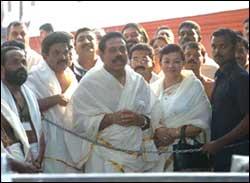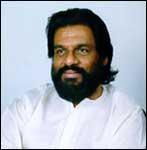|
|
| Help | |
| You are here: Rediff Home » India » News » Special |
|
| |||||||||||||||||||||||
|
| |||||||||||||||||||||||
Kerala's famous Lord Krishna temple at Guruvayoor bars non-Hindus from entering the shrine.
But the ban is not confined to people from all non-Hindu faiths.
 Last week, Sri Lankan President Mahinda Rajapakse, a Buddhist, traveled to Kerala [Images] to offer a gold crown to the Guruvayoor temple and to pray for peace in his country.
Last week, Sri Lankan President Mahinda Rajapakse, a Buddhist, traveled to Kerala [Images] to offer a gold crown to the Guruvayoor temple and to pray for peace in his country.
By worshipping at the temple (image alongside), Rajapakse said he had fulfilled a vow made during the presidential election, which he won on November 17.
'The LTTE (Liberation Tigers of Tamil Eelam) has been invited for talks and we expect its chief (Velupillai) Prabhakaran to respond positively. I prayed for that,' Rajapakse told reporters after his visit.
The Sri Lankan leader donated Rs 13,000 for an offering of ghee to the deity. In addition to the gold crown, he also offered a lamp at the shrine.
The largest number of foreigners visiting Guruvayoor must be from Sri Lanka [Images], reveals an official at the Guruvayoor Devaswom Board, which administers the temple. Many Sri Lankan ministers and officials visit the shrine.
Former Sri Lankan prime minister Ranil Wickremesinghe -- and the man Rajapakse defeated in the presidential election -- is an ardent devotee of the temple. Wickremesinghe's private secretary Valsan, in fact, hails from Thrissur district where Guruvayoor is located. Guruvayoor was also a must visit destination for the late Sri Lankan foreign minister Lakshman Kadirgamar, who was assassinated in July.
Does Guruvayoor allow entry to Buddhists?
"Yes, not just to Buddhists, but to Jains also," temple administrator K Anil Kumar told Rediff India Abroad. "The Guruvayoor temple has not banned entry to Buddhists and Jains, because they are treated as part of Hinduism."
It is not just the Guruvayoor temple, he said, but priests at most temples across the country have traditionally recognised Hindus, Buddhists and Jains from undivided India, Nepal, Sri Lanka and Bhutan, as entitled to enter the temples.
"We have many devotees belonging to these religions," he said.
Will the temple permit people from other religions to worship? "Right now, no such decision has been taken. The avowed policy is that non Hindus cannot enter the temple," Kumar pointed out.
There are several examples of the Guruvayoor temple closing its doors on people from other religions, who are ardent devotees of Lord Krishna.
The most notable instance is, of course, the incident involving the famous singer K J Yesudas (right, below). Yesudas, who has sung  several songs in praise of Lord Krishna, was denied entry to the temple because he was born a Christian.
several songs in praise of Lord Krishna, was denied entry to the temple because he was born a Christian.
Poet Yusufali Kecherry, who has penned some of the best Malayalam songs on Lord Krishna, has similarly not been not allowed to enter the Guruvayoor temple because he is a Muslim.
Five years ago, when Congress General Secretary Vayalar Ravi's only son was married at Guruvayoor, a purification rite was performed to cleanse the temple premises because Ravi's wife is not a Hindu, but a Christian.
As rediff columnist Rajeev Srinivasan pointed out in his October 2000 column What made Ravi's case interesting was the fact that he 'belongs to the 'backward caste', the Ezhavas, who are numerically powerful in Kerala and have been the mainstay of the Marxist party in the state (the Communist Party of India-Marxist). Many Ezhavas have been agricultural labourers and tenant farmers who benefited from the Left's land distribution and labour-friendly policies.'
'The Ezhavas also led the Vaikom Satyagraha of 1924,' Srinivasan wrote,'and the struggle that led to the epoch-making Temple Entry Proclamation in 1936 that threw open to all Hindus, regardless of caste, all of the-then kingdom of Travancore's temples. This singular event enabled Ezhavas in particular and the so-called 'lower-castes' of Kerala in general to gain self-respect, and to participate fully in the economic and political life of the state.'
Azhvanchery Raman Namboodiri, a Hindu reformist, says it is not just the Guruvayoor temple where no-entry boards have been posted for people of other religions. Temples at Sabarimala, Kadampuzha, Chottanikkara and Vaikkom in Kerala also do not allow devotees of other religions to worship.
"The no-entry boards in front of these temples have hurt sentiments. There is a long-pending demand to open the temple doors to all," says Namboodiri.
Two years ago, Namboodiri convened a conclave of Hindu priests and heads of various Hindu organisations in Kerala to debate whether temples should permit entry to all, irrespective of religion.
"My progressive ideology has not yet succeeded," he told Rediff India Abroad. "I hope one day it will."
Five years ago, the then Marxist-led Left Democratic Front government in Kerala examined proposals to permit non-Hindus to enter the Guruvayoor temple, without in any way affecting the shrine's tradition, culture and sanctity. But nothing came of that move.
"This is religious discrimination and it should end," says Marxist leader C K Nanu, temple minister in the then Left Democratic Front government.
"The time is up for another temple declaration allowing entry of non-Hindus to temples like Guruvayoor," Nanu added.
Photograph of Sri Lankan President Mahinda Rajapakse: Malayala Manorama/ Devadas P.R.
Rediff Specials
|
|
| © 2008 Rediff.com India Limited. All Rights Reserved. Disclaimer | Feedback |